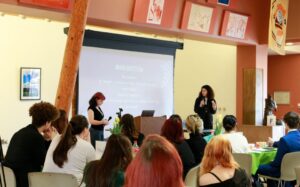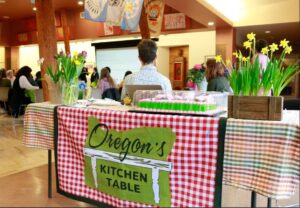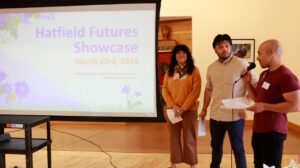Designing for Connection: Hatfield Futures Students Propose Solutions to Critical Challenges Facing Oregon Communities

At the second Hatfield Futures Showcase held this spring at Portland State University, a team of high school students from Bend Technical Academy proposed a solution to the fentanyl overdose crisis. It didn’t involve supervised injection sites, or fentanyl strips. It was the creation of FULL STOP, a student-led peer program to implement in schools to provide overdose awareness and healthy outlets and community support for youth. The students’ theory was that the opposite of addiction is connection, so solutions should foster connection.
The students arrived at this idea after 10 weeks of the Hatfield Futures Project, which engages high school students in Oregon to create solutions to the issues facing their communities by envisioning how these will shape life in Oregon in the future, specifically in 2050. Students apply from around the state as a team or as individuals later paired with a team. Once selected, up to six teams each identify an issue.
“The criteria for the issue is: You can feel it, touch it, see it in your own community, and it connects to bigger trends,” says Wendy Willis, Director of Oregon Kitchen Table Kitchen Table Democracy and Director of Civic Engagement for the National Policy Consensus Center at Portland State University.
Guided by project guides (PSU faculty, staff and graduate students) and student peers (students who participated in Hatfield Futures in 2023), teams are introduced to futures thinking, which helps them to imagine life in 2050. They learn about mega-trends — political, financial, and environmental — and how to analyze these to understand they impact the team’s issue over time to 2050. Then they think about interventions to interrupt the trend. Students are encouraged to suspend deciding on immediate solutions, or that they know what the solution is, and to consider the causes first.
“There’s a ton of reasons that things might be the way that they are,” says Eliot Feenstra, Project Manager at Oregon Kitchen Table. “Let’s look at all of the causes and try to use play and imagination to think as expansively about the future and what could happen as if it’s not set in stone, which is kind of the central sense of futurism: the future is not set, we are making it…so let’s imagine what we want it to be and then fight for that.”
The Bend team didn’t arrive set on the idea that connection is the opposite of addiction. Each student came to the project at first with an experience of fentanyl overdose, in their community or family. As a team, they thought through the reasons for drug use and overdose, the relationships between addiction and health and poverty, and considered how a future of reduced harm and drug overdoses could be shaped.
The harm reduction strategy of the Bend team includes community gardens for kindergartners to create positive environments of learning and connection early on. Willis says it was unlike anything she’s seen.
“It pushed them upstream in a way that I would not have predicted,” she said of coming to the connection theory. ”There were the effects of opioids too, but baked in was that everything we do is about connecting people to each other, so that everyone has somebody when they are in crisis.”
Thinking this far into the future brings flexibility to the solution as well, and makes room for the unknown as best it can. Combating drug overdose with a strategy that doesn’t specifically target the drug or any one factor, and instead aims to address the roots of a problem by creating positive relationships and connection, prepares FULL STOP to be an adaptable approach.
“We are solving for fentanyl now but we don’t know what the next thing is,” says Willis.
Teaming up with peers from around the state and workshopping ways to create and present solutions has been a positive force and a good time for students, even as they are tackling some challenging issues. “It’s trauma-informed without talking about being trauma-informed,” says Feenstra. “There’s a lot of joy in the program.” Students get to stay in a hotel for the camp and showcase, share good food, and participate in games as part of the project.
The Hatfield Futures Project began in 2022 when faculty members at PSU were creating a book which examined mega-trends and envisioned their impact in 2050 in Oregon. When there was a desire to do community engagement around the book, faculty brainstormed how to go about this in an exciting way.
“We asked, Who’s going to lead in 2050? Who has the most to gain or lose in 2050?”, said Willis.
 The Hatfield Futures Project was launched as a project of Oregon’s Kitchen Table, a program of the National Policy Consensus Center, housed in the Mark O. Hatfield School of Government at Portland State University. Students began camp in the winter of the 2022 – 2023 school year and took part in the first showcase in March 2023. Over the last two years, high school students have come from all over the state to participate, including rural areas that do not have a lot of programming. Students have sought solutions for housing and homelessness issues, consent education, and trash issues. Climate and the environment are overarching topics. One team focused on saving a kelp forest on Oregon’s south coast; another aimed to reduce the agricultural use of pesticides. The Gray Family Foundation awarded a grant to The Hatfield Futures Project for this work in developing innovative solutions through youth development and leadership.
The Hatfield Futures Project was launched as a project of Oregon’s Kitchen Table, a program of the National Policy Consensus Center, housed in the Mark O. Hatfield School of Government at Portland State University. Students began camp in the winter of the 2022 – 2023 school year and took part in the first showcase in March 2023. Over the last two years, high school students have come from all over the state to participate, including rural areas that do not have a lot of programming. Students have sought solutions for housing and homelessness issues, consent education, and trash issues. Climate and the environment are overarching topics. One team focused on saving a kelp forest on Oregon’s south coast; another aimed to reduce the agricultural use of pesticides. The Gray Family Foundation awarded a grant to The Hatfield Futures Project for this work in developing innovative solutions through youth development and leadership.
At the 2024 showcase students presented in front of an audience of around 200 people which included elected officials, faculty members, family and friends. It’s a big room, lunch is served, and everyone is there to listen. Willis and Feenstra reflect on the responses from the audience and the collective feeling of being blown away by the presentations.
“The focus in the program had been on supporting the students, but somehow there was this flip that happened in the showcase for me,” says Feenstra. “As an adult living in the world, this is extremely inspiring, we needed this. That’s what the adults in the room were saying, we needed this.”
Both Willis and Feenstra say the project is evolving and look forward to how it will progress over time. Just in its second year, it’s already making an impact. The principal of Bend Technical Academy was at the 2024 showcase, and the FULL STOP program is running as a pilot program. It will be brought before the school board later this year.

